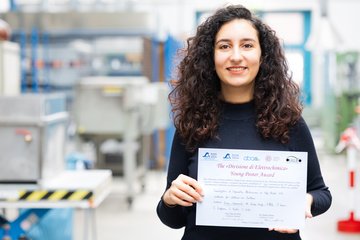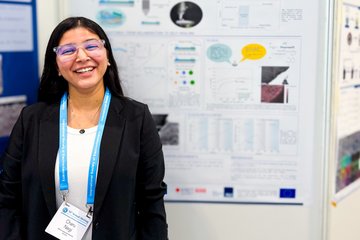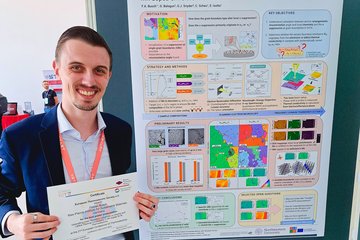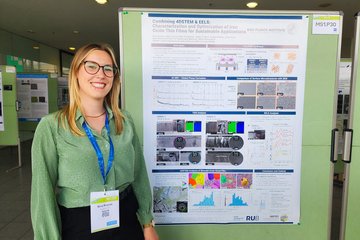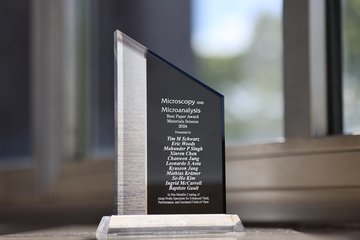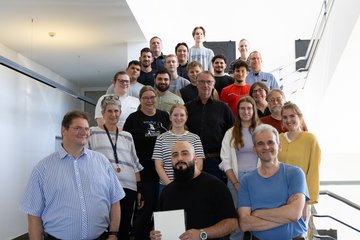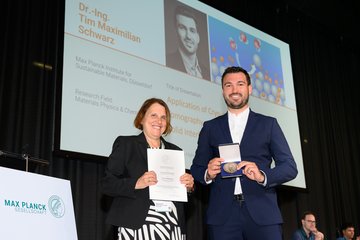Alle Typen
21.
Zeitschriftenartikel
Polymorphism and Building-Block-Resolved STM Imaging of Self-Assembled Monolayers of 4-Fluorobenzenemethanethiol on Au(111). ChemPhysChem 23 (19), e202200347 (2022)
22.
Zeitschriftenartikel
In situ microscopic investigation of ion migration on the surface of chromium coated steels. npj Materials Degradation 6 (1), 76 (2022)
23.
Zeitschriftenartikel
Nano-sized cerium vanadium oxide as corrosion inhibitor: A microstructural and release study. Electrochimica Acta 425, 140696 (2022)
24.
Zeitschriftenartikel
Deep learning framework for uncovering compositional and environmental contributions to pitting resistance in passivating alloys. npj Materials Degradation 6 (1), 71 (2022)
25.
Zeitschriftenartikel
Neutral inhibitor molecules entrapped into polypyrrole network for corrosion protection. Chemical Engineering Journal 440, 135739 (2022)
26.
Zeitschriftenartikel
A new insight into the rate determining step of cathodic delamination. Corrosion Science 202, 110311 (2022)
27.
Zeitschriftenartikel
Organic composite coatings containing mesoporous silica particles: Degradation of the SiO2 leading to self-healing of the delaminated interface. Corrosion Science 200, 110252 (2022)
28.
Zeitschriftenartikel
Migration of ions on oxygen-deficient chromium oxide electrodeposited from trivalent chromium electrolyte. Corrosion Science 199, 110185 (2022)
29.
Zeitschriftenartikel
Hydrogen-based direct reduction of iron oxide at 700°C: Heterogeneity at pellet and microstructure scales. International Journal of Minerals, Metallurgy and Materials 29 (10), S. 1901 - 1907 (2022)
30.
Zeitschriftenartikel
A combinatorial study of the effect of Al and Cr additions on the mechanical, physical and corrosion properties of Fe. Materials Today Communications 29, 102947 (2021)
31.
Zeitschriftenartikel
Design of Nanostructured Protective Coatings with a Sensing Function. ACS Applied Materials and Interfaces 13 (44), S. 53046 - 53054 (2021)
32.
Zeitschriftenartikel
Optimizing smart self-healing coatings: Investigating the transport of active agents from the coating towards the defect. Corrosion Science 190, 109661 (2021)
33.
Zeitschriftenartikel
Chromium coatings from trivalent chromium plating baths: Characterization and cathodic delamination behaviour. Corrosion Science 187, 109525 (2021)
34.
Zeitschriftenartikel
Investigation of selective oxidation during cooling of hot-rolled iron-manganese-silicon alloys. Corrosion Science 186, 109466 (2021)
35.
Zeitschriftenartikel
Influence of Microstructure and Atomic-Scale Chemistry on Iron Ore Reduction with Hydrogen at 700°C. Acta Materialia 212, 116933 (2021)
36.
Zeitschriftenartikel
Limiting Current Density of Oxygen Reduction under Ultrathin Electrolyte Layers: From the Micrometer Range to Monolayers. ChemElectroChem 8 (4), S. 712 - 718 (2021)
37.
Zeitschriftenartikel
Perspective on experimental evaluation of adsorption energies at solid/liquid interfaces. Journal of Solid State Electrochemistry 25 (1), S. 33 - 42 (2021)
38.
Zeitschriftenartikel
Selective oxidation of ternary Fe–Mn–Si alloys during annealing process. Corrosion Science 174, 108859 (2020)
39.
Zeitschriftenartikel
Direct growth of graphene on GaN via plasma-enhanced chemical vapor deposition under N2 atmosphere. 2D Materials 7 (3), 035019 (2020)
40.
Zeitschriftenartikel
PtIr protective coating system for precision glass molding tools: Design, evaluation and mechanism of degradation. Surface and Coatings Technology 385, 125378 (2020)
